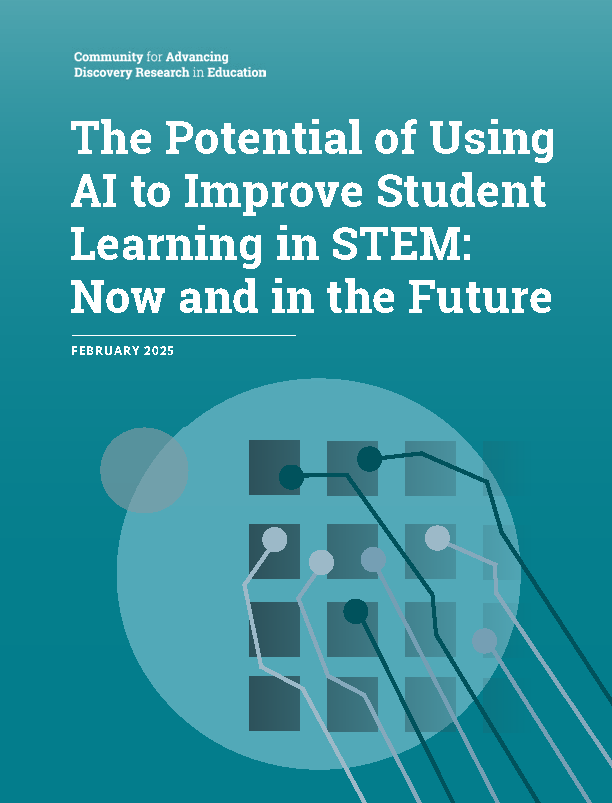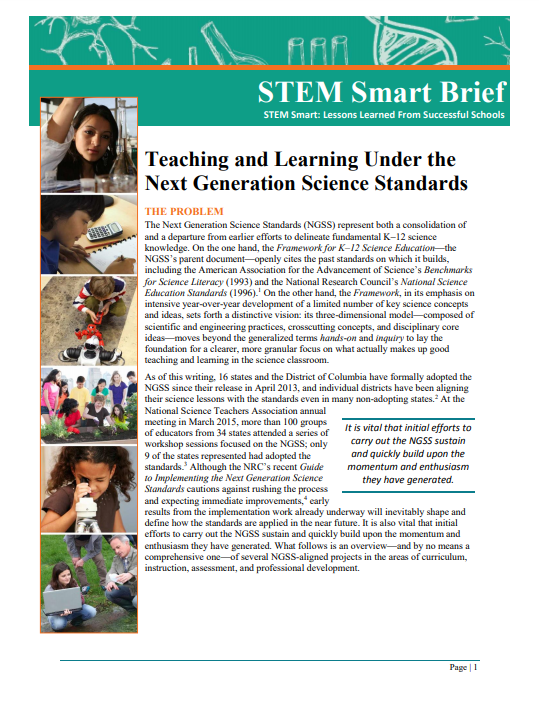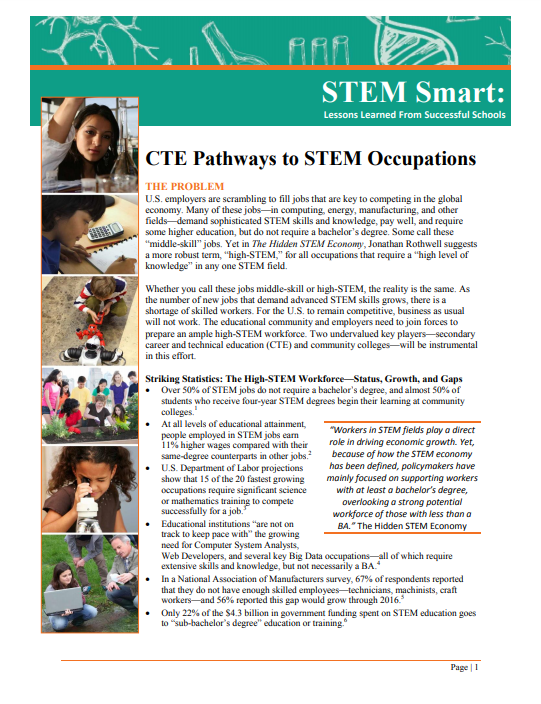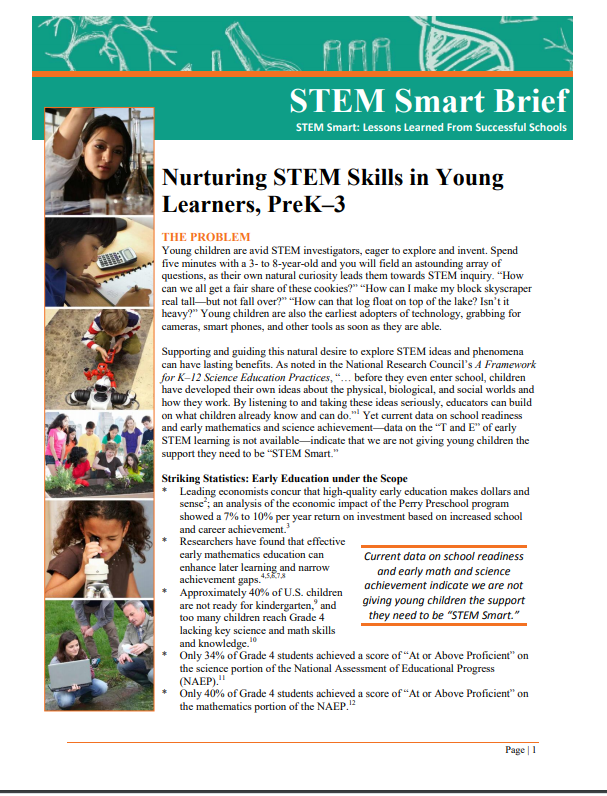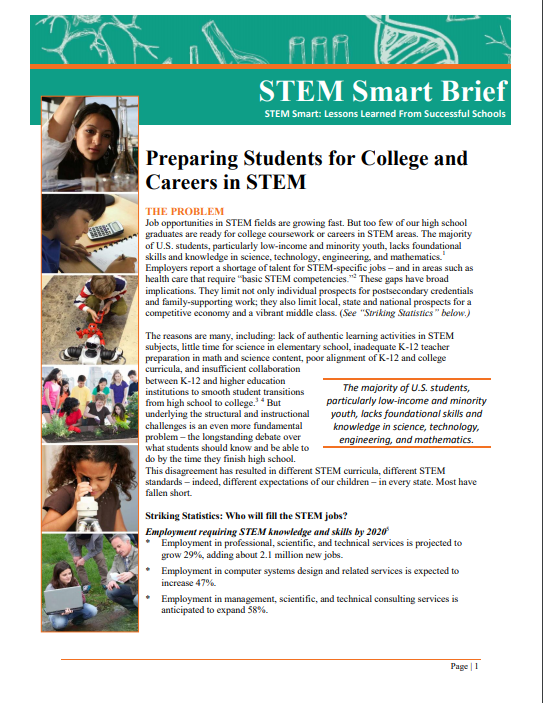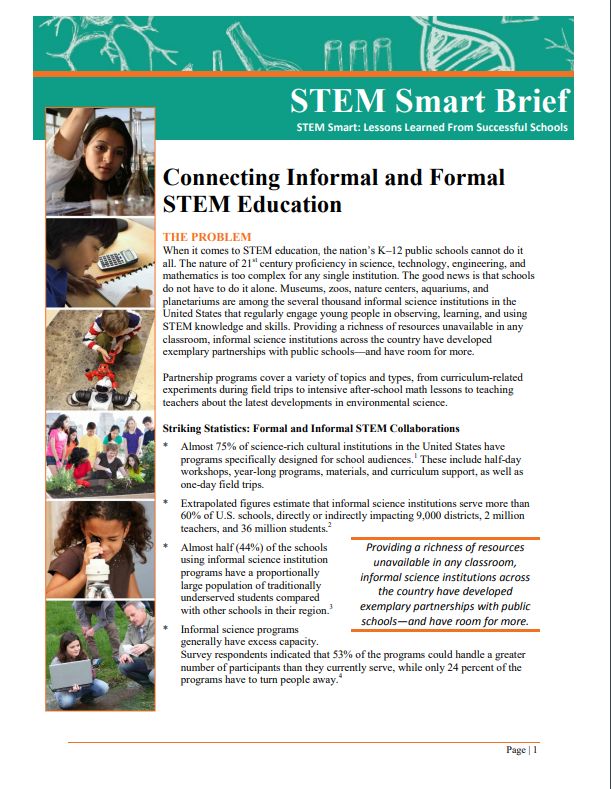The following resources have been produced by CADRE partners and/or DRK-12 PIs with support from CADRE. They provide information on the research that is currently funded, the variety of instruments and methodologies in use, and strategies for effective partnering, dissemination, and knowledge use.
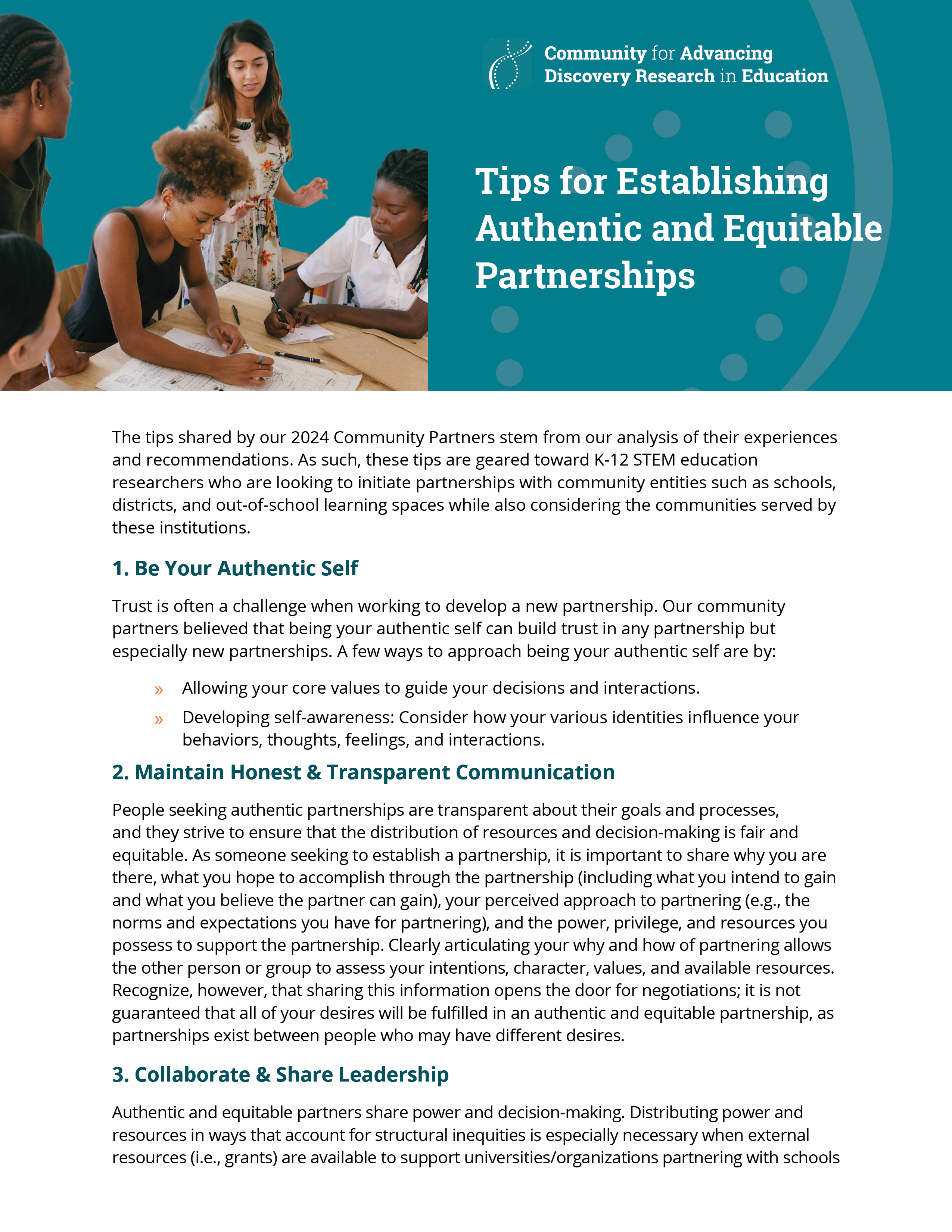 Tips for Establishing Authentic and Equitable Partnerships
Tips for Establishing Authentic and Equitable Partnerships
July 2025
This resource shares insights and actionable guidance from CADRE's 2024 Community Partners on how to foster authentic partnerships with schools, districts, and out-of-school learning organizations. Designed for K–12 STEM education researchers, the tips emphasize trust-building, shared leadership, responsiveness to community needs, and long-term commitment. These recommendations offer a roadmap for forming relationships that center community voices and values—ensuring that research efforts are collaborative, respectful, and impactful.
The Potential of Using AI to Improve Student Learning in STEM: Now and in the Future
February 2025
This brief explores how artificial intelligence (AI) can serve as a transformative learning partner in K–12 STEM education through AI's potential to offer personalized support, scaffold cognitive and metacognitive processes, and enhance student motivation and collaboration. Additionally, the authors consider how AI can promote access to STEM learning, while also addressing the need to identify and mitigate biases in AI system development to ensure broad and effective application.
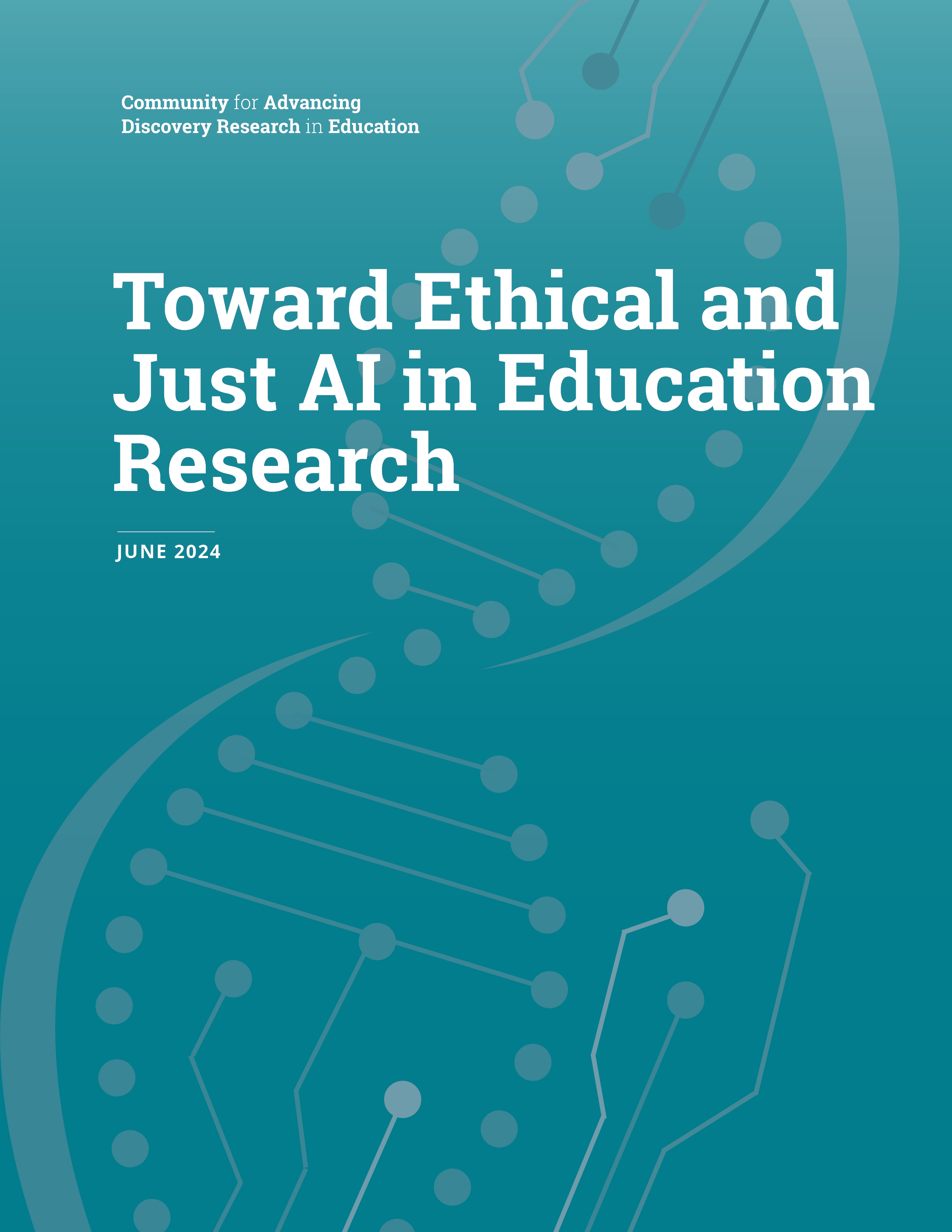 Toward Ethical and Just AI in Education Research
Toward Ethical and Just AI in Education Research
June 2024
This brief offers guidance to researchers and developers for responsible AI research and implementation in educational settings. The brief describes an ethical artificial intelligence in education (AIED) framework and a set of tools to support inclusive and equitable AIED research and development.
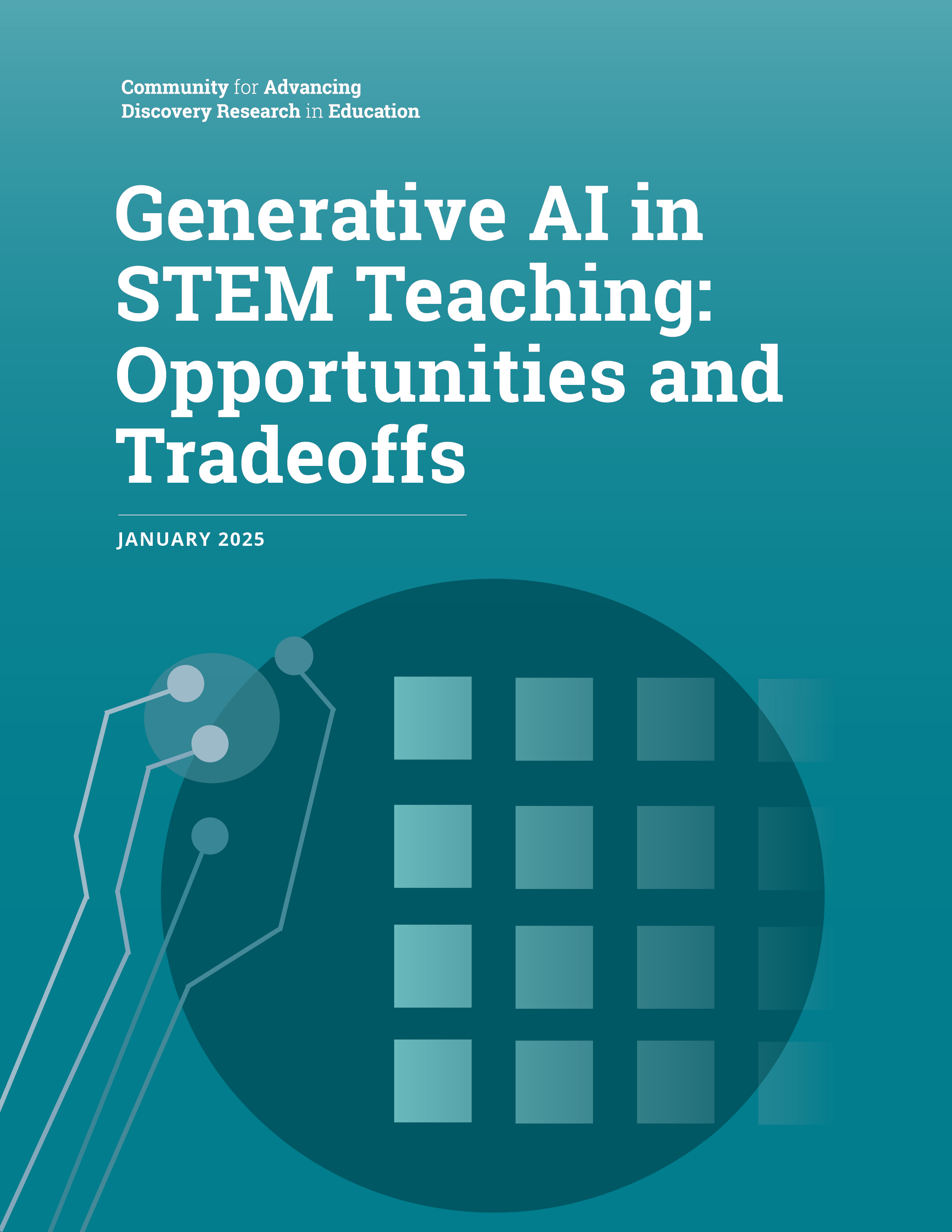 Generative AI in STEM Teaching: Opportunities and Tradeoffs
Generative AI in STEM Teaching: Opportunities and Tradeoffs
January 2025
This brief of the series examines how GenAI may shape STEM classrooms in the near future and identify promising trajectories for integrating GenAI into STEM teaching, including the potential for personalized teaching approaches. They reaffirm the essential role of teachers and emphasize the need to include teachers in the design, development, and study of GenAI tools that are intended to benefit STEM education.
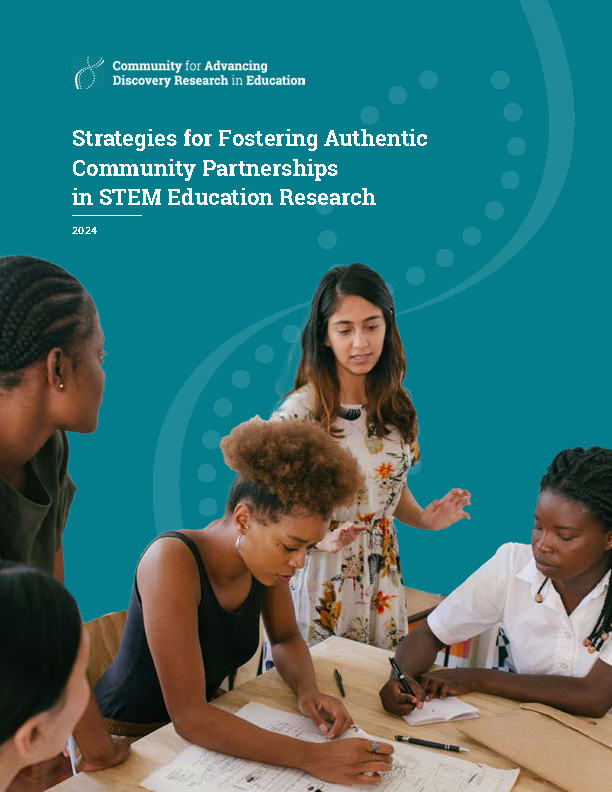 Strategies for Fostering Authentic Community Partnerships in STEM Education Research
Strategies for Fostering Authentic Community Partnerships in STEM Education Research
June 2024
What are the opportunities and challenges for establishing community partnerships among K–12 STEM education researchers and Black and Brown communities? CADRE partners interviewed five community partners from diverse backgrounds in STEM education to understand how STEM education researchers can better engage with communities and share their insights in this brief.
 Recruiting and Retaining Participants for Your Education Research
Recruiting and Retaining Participants for Your Education Research
May 2024
CADRE interviewed researchers to learn about their most effective strategies for recruiting and retaining participants for STEM education research. While there are no shortcuts to successful recruitment, a sustained commitment to understanding and addressing the needs of a district and its teachers is key to long-term success. In this new brief, CADRE share practices that have proven successful for experienced researchers.
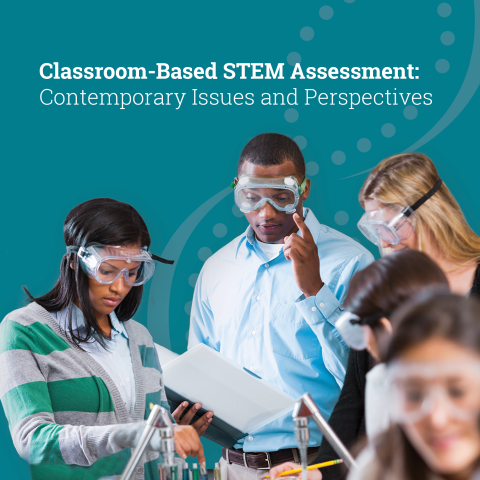 Classroom-Based STEM Assessment: Contemporary Issues and Perspectives
Classroom-Based STEM Assessment: Contemporary Issues and Perspectives
August 2023
This report takes stock of what we currently know about using classroom assessment to benefit the teaching and learning of STEM subject matter in K-12 classrooms and discusses future directions for research.
Uncovering the Hidden Curriculum of DRK-12
2022 - 2024
This video podcast features CADRE co-PIs Ilana Horn and Terrell Morton offer insights into aspects of NSF's DRK-12 project and proposal development, proposal review, and project management: Post Panel Pop-off (2022), Responding to Rejection (2022), If I Knew Then, What I Know Now (2023), Managing Your NSF Budget (2024), and Developing and Managing a Budget (2024).
 Insight from DRK-12 CAREER Awardees
Insight from DRK-12 CAREER Awardees
May 2020
This resource contains advice from CAREER awardees in the DRK-12 portfolio about how to develop a competitive proposal and successfully manage a CAREER project based on their experience.
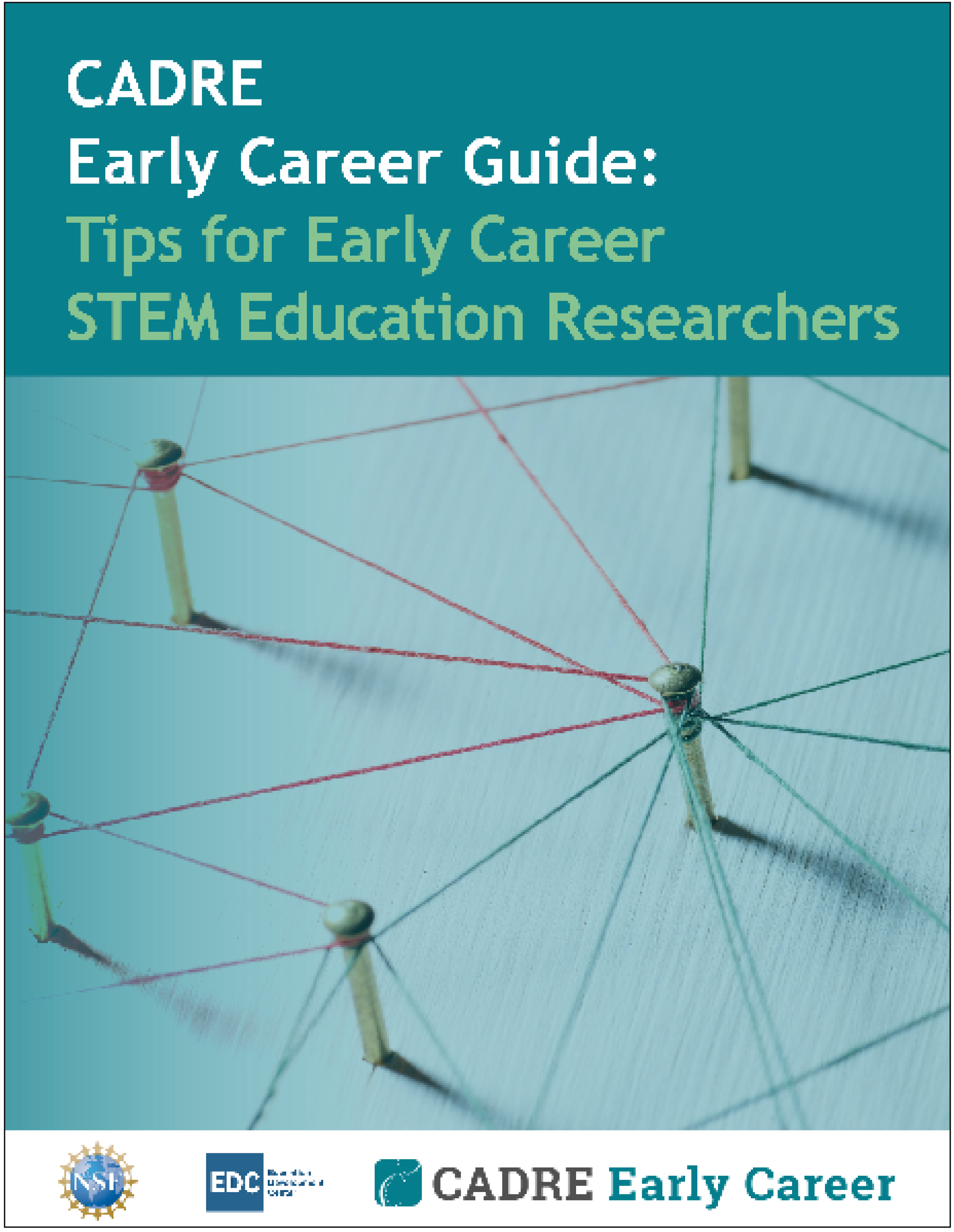 CADRE Early Career Guide: Tips for Early Career STEM Education Researchers
CADRE Early Career Guide: Tips for Early Career STEM Education Researchers
October 2019 (Rev. ed.)
The CADRE Early Career Guide offers advice from experienced DRK-12 awardees on becoming a successful researcher in the field of STEM education. The guide also profiles a support program, the CADRE Fellows, for doctoral students in STEM education research.
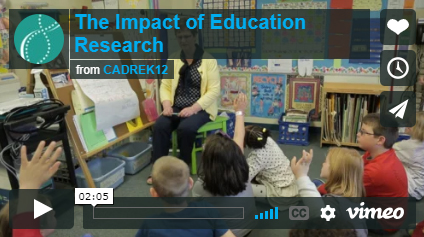 CADRE Short Videos: STEM Ed Research Takeaways for Practice
CADRE Short Videos: STEM Ed Research Takeaways for Practice
2018-2020
This series of short videos by CADRE share STEM education research takeaways for practice on topics including engineering, scientific modeling, professional development, early math, broadening participation, technology, and the impact of engineering research.
 Creating Inclusive PreK-12 STEM Learning Environments
Creating Inclusive PreK-12 STEM Learning Environments
October 2018
Broadening participation in PreK–12 STEM provides ALL students with STEM learning experiences that can prepare them for civic life and the workforce. This brief urges districts, schools, and states to take concrete, level-appropriate actions to broaden participation so all students benefit from quality STEM.
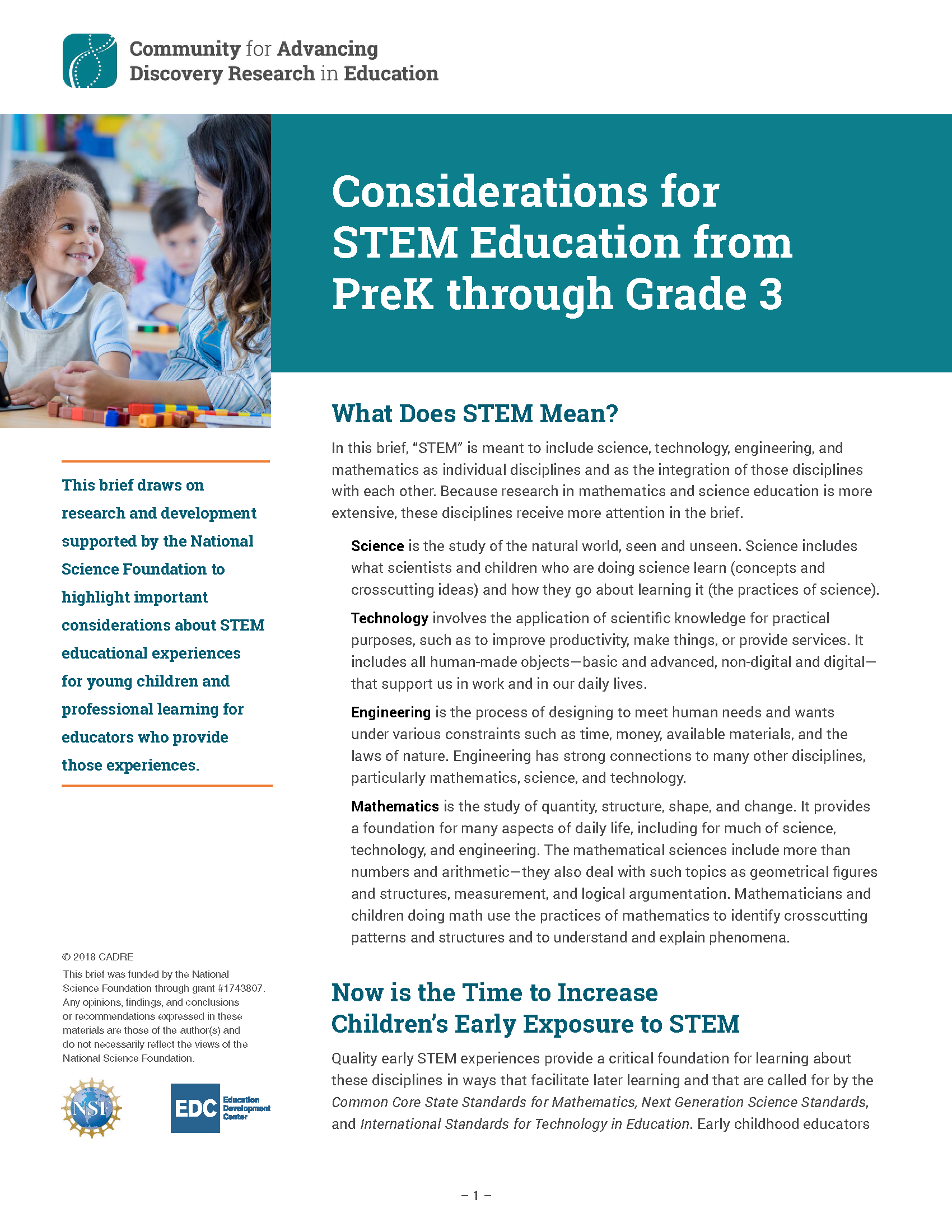 Considerations for STEM Education from PreK through Grade 3
Considerations for STEM Education from PreK through Grade 3
September 2018
This brief draws on research and development supported by the National Science Foundation to highlight important considerations about STEM educational experiences for young children and professional learning for educators who provide those experiences.
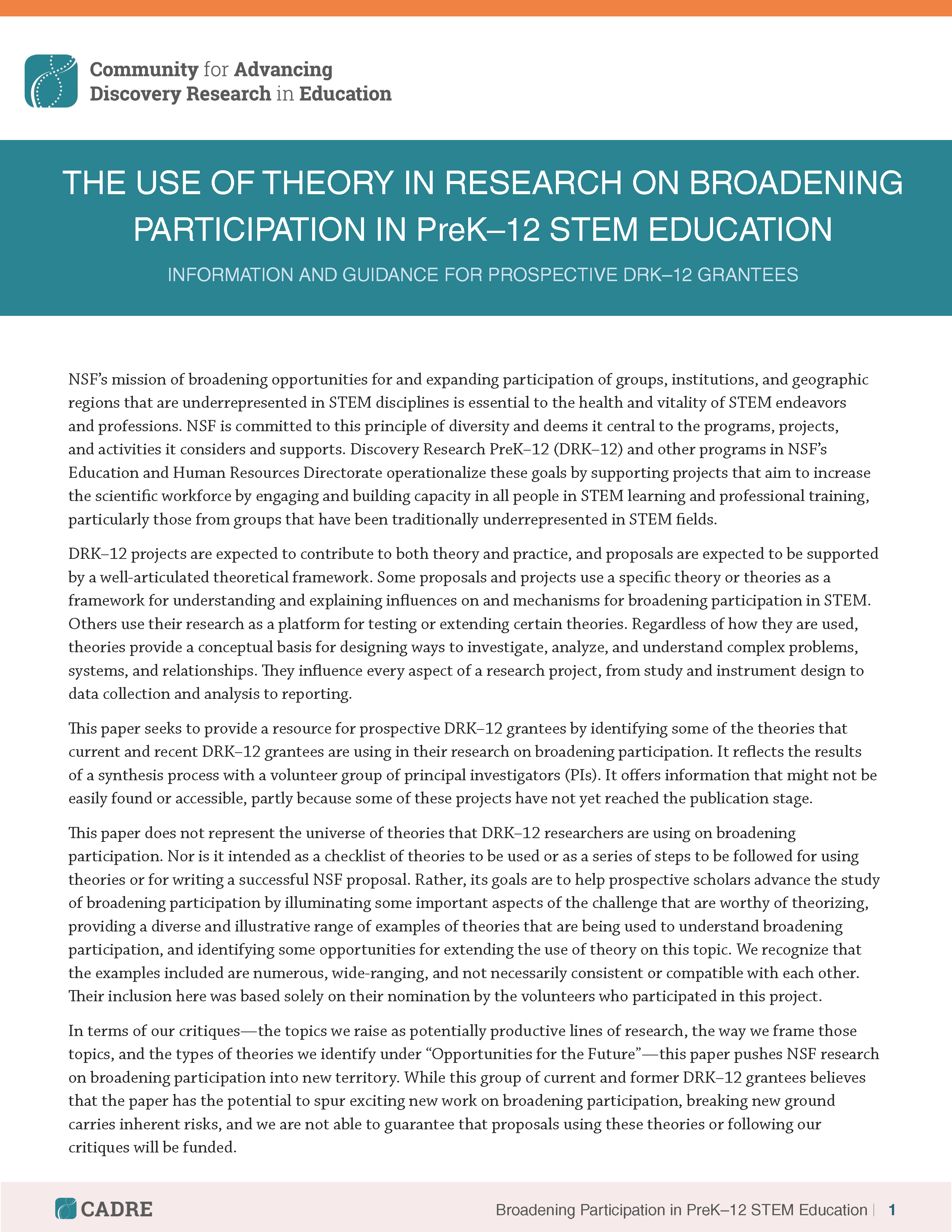 The Use of Theory in Research on Broadening Participation in PreK–12 STEM Education: Information and guidance for prospective DRK–12 grantees
The Use of Theory in Research on Broadening Participation in PreK–12 STEM Education: Information and guidance for prospective DRK–12 grantees
August 2018
This paper seeks to provide a resource for prospective DRK–12 grantees by identifying some of the theories that current and recent DRK–12 grantees are using in their research on broadening participation. It reflects the results of a synthesis process with a volunteer group of principal investigators (PIs). It offers information that might not be easily found or accessible, partly because some of these projects have not yet reached the publication stage.
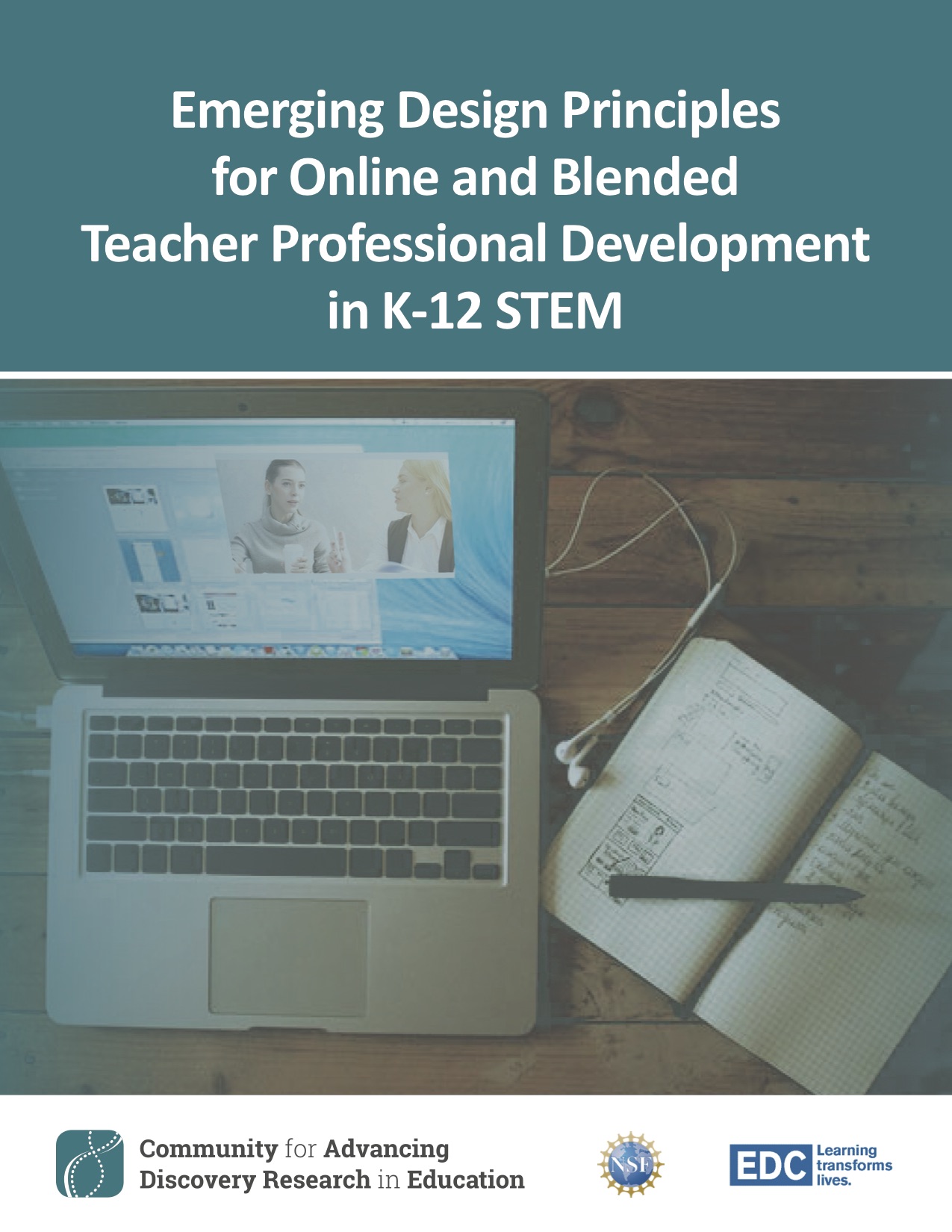 Emerging Design Principles for Online and Blended Teacher Professional Development in K-12 STEM Education
Emerging Design Principles for Online and Blended Teacher Professional Development in K-12 STEM Education
November 2017
Between February and September 2017, awardees representing 11 projects participated in a series of activities designed to elicit and form consensus around emerging design principles for online and blended teacher PD programs in K–12 STEM education. The resulting principles are organized and presented around three themes in this report.
Tips for Preparing NSF Project Reports
October 2017
In this brief, CADRE has compiled tips on preparing and submitting NSF project reports—annual, interim, final, and product outcome reports.
Findings From the 2017 DRK-12 Program Survey
February 2017
This report presents key findings from a keyword survey administered in 2017 to the principal investigators of the CADRE Discovery Research PreK–12 (DRK–12) program during the fall of 2017. The survey asked respondents to select keywords that described their projects’ target audiences, foci, research, and evaluation.
Teaching and Learning Under the Next Generation Science Standards
February 2016
This STEM Smart brief describes the challenges of implementing the Next Generation Science Standards (NGSS) as well as research and promising practices in curriculum, instruction, assessment, and professional development adopting the NGSS.
 Analysis of the National Science Foundation’s Discovery Research K–12 ELL Projects
Analysis of the National Science Foundation’s Discovery Research K–12 ELL Projects
February 2016
This article examines whether funding provided through the National Science Foundation’s (NSF) Discovery Research K-12 (DRK-12) program has made a unique contribution to the research in the fields of science and mathematics education for ELs.
CADRE Tips for Mentoring Early Career STEM Education Researchers and Developers
October 2015
This resource provides guidelines that may help new mentors and mentees establish an effective and productive relationship.
Mentoring for the Postdoctoral/Early Career Researcher: Key Elements and Broader Impacts
July 2015
This CADRE brief describes the need for effective mentoring relationships and examines elements of good mentoring practices based on a growing body of literature from the field.
Early Career Researchers and Developers in the DR K–12 Program: Needs, Supports, and Recommendations
August 2014
The future strength of the National Science Foundation’s (NSF) K-12 education research and development efforts depends in part on the development of promising early career researchers and developers—including doctoral students, post-docs, and first time principal investigators (PIs)—who can grow into R&D leaders and form an impactful R&D workforce. This brief promotes deliberation on how to improve support and guidance for early career researchers and developers in the DRK-12 program, as well as in the broader field of STEM education R&D.
CTE Pathways to STEM Occupations
May 2014
This STEM Smart brief describes the challenges of creating CTE pathways to STEM occupations and offers examples of promising programs and recommendations for realizing the full potential of secondary CTE and community colleges in preparing students for college and careers.
A Targeted Study of Gaming and Simulation Projects in DRK-12
March 2014
In recent years, there has been increasing recognition and exploration of the potential for technology resources such as games and simulations to support science and math learning. With the growing attention to these types of educational technologies, the Community for Advancing Discovery Research in Education conducted a brief targeted study to better understand the gaming and simulation research and development work being funded within the NSF’s DRK-12 program and to highlight the innovative programs, models, and resources that may contribute to these fields.
Nurturing STEM Skills in Young Learners, PreK–3
December 2013
This STEM Smart brief describes the challenges of nurturing STEM skills in young learners and offers examples of key research and promising programs, as well as recommendations for creating a strong, smooth continuum of PreK–3 STEM learning.
A Targeted Study of the DRK–12 Engineering Education Projects
October 2013
Because engineering education is drawing increased attention from STEM policy-makers, it is an opportune time to take stock of the current status of ongoing innovation in K–12 engineering education; therefore, the Community for Advancing Discovery Research in Education (CADRE) conducted a brief targeted study to investigate the work that is being funded in K-12 engineering education within NSF’s Discover Research K–12 (DRK–12) program.
Moving STEM Education Forward: National Priorities and the National Science Foundation’s DRK-12 Program
July 2013
Improving STEM education in the United States is a priority expressed by policymakers, practitioners, and business leaders. This brief describes the innovative research and development projects that could help propel needed changes in STEM learning.
Engineering: Emphasizing the “E” in STEM Education
June 2013
This STEM Smart brief describes the current state of engineering education including the benefits and challenges to implementation, and offers examples of promising programs.
Descriptive Overview of the Discovery Research K-12 (DRK-12) Portfolio: Projects Funded from 2007 to 2012
June 2013
This description overview of the DRK-12 portfolio is the fifth and final portfolio overview to be prepared by CADRE. The report describes important characteristics of the first six cohorts of DRK-12 projects that received their initial funding from 2007 to 2012 and characterizes the development and research in STEM education—on resources, models, and technologies—funded by the DRK-12 program.
Preparing Students for College and Careers in STEM
March 2013
This STEM Smart brief describes the challenges of preparing students for STEM careers and college programs and offers a standards-based solution, promising programs, and recommendations.
Evaluation in DRK-12 Projects: Options
November 2012
Each DRK-12 project has formative and summative evaluation, which are different from the project’s own R&D activities and instead should support and measure the effectiveness of those activities. This paper discusses evaluation options for investigators and evaluators to consider.
From Dissemination to Knowledge Use: Options for DRK-12
November 2012
To foster knowledge use among policy makers or practitioners requires a substantial effort that invests in sustained interaction and enlists a range of supports for the prospective knowledge users. This paper discusses some options for more effective dissemination efforts that could lead to knowledge use.
Compendium of STEM Student Instruments PART II: Measuring Students’ Content Knowledge, Reasoning Skills, and Psychological Attributes
November 2012 (with May 2013 Addendum)
This compendium of measures is Part II of a two part series to provide insight into the measurement tools available to generate efficacy and effectiveness evidence, as well as understand processes relevant to teaching and learning. Part I looks at teacher outcome assessments, and Part II looks at student outcome assessments.
Compendium of Research Instruments for STEM Education, PART I: Teacher Practices, PCK, and Content Knowledge
August 2012 (with May 2013 Addendum)
The purpose of this compendium is to provide an overview on the current status of STEM instrumentation commonly used in the U.S and to provide resources for research and evaluation professionals. Part 1 of a two-part series, the goal to provide insight into the measurement tools available to generate efficacy and effectiveness evidence, as well as understand processes relevant to teaching and learning. It is focused on instruments designed to assess teacher practices, pedagogical content knowledge, and content knowledge.
Discovery Research K-12 (DRK-12): Descriptive Overview of Portfolio
August 2012
This overview is intended to describe the scope and depth of research and development DRK-12 has funded and to identify areas that could be advanced by further investigations by CADRE. The overview summarizes the 248 projects that met the criteria for inclusion and analysis.
Partnering with Users to Develop STEM Education Materials: Insights from Discovery Research K-12 Projects
August 2012
This brief suggests practical ways of engaging teachers and other “end-users” in projects that develop materials for education in the areas of science, technology, engineering, and math (STEM). Projects described in this brief have benefited from school, district, and state users serving as Co-PIs, advisory board members, co-developers, implementation managers, data collectors, professional developers, and project emissaries to the broader field. The brief describes how K-12 end-users and decision-makers are instrumental for developing materials that will be adopted, implemented with essential fidelity, sustained at classroom and organizational levels, and scaled within and to new organizations.
New Measurement Paradigms
April 2012
This collection of New Measurement Paradigms papers represents a snapshot of the variety of measurement methods in use at the time of writing across several projects funded by the National Science Foundation through its REESE and DRK–12 programs. The collection is designed to serve as a reference point for researchers who are working in projects that are creating e-learning environments in which there is a need to make judgments about students’ levels of knowledge and skills, or for those interested in this but who have not yet delved into these methods.
Connecting Informal and Formal STEM Education
February 2012
This STEM Smart brief describes the challenges of informal and formal collaborations and offers examples of key research and recommendations for developing more effective programs.
Education R&D Partnership Tool
January 2012
Based on the lessons of education practitioners, researchers, and developers who have partnered on R&D projects, this tool is intended to help others assess and improve their own R&D partnerships. The tool includes a worksheet that prompts reflection and discussion as well as tips for starting and sustaining a partnership dialogue.
Practice-Engaged Research and Development in Education
March 2011
This paper argues that reciprocal arrangements between R&D and practice can have intellectual merit as well as practical value. Specifically, it describes the benefits of education research and development (R&D) arrangements and policies that is centered in practitioners’ purposes and environments, that exploits a multi-stage process of development, that attends to organizational and community contexts, and that builds cumulative knowledge across projects and studies. Based upon business scholarship addressing organizational constraints and opportunities for new approaches to R&D, it acknowledges the education R&D might benefit from considering analogous ideas.
Math and Science Education with English Language Learners: Contributions of the DRK-12 Program
January 2011
CADRE conducted an analysis of the projects within the NSF’s DRK-12 portfolio studying ELLs to better understand how the work supported by the program is advancing our understanding of ELLs’ learning in science and mathematics. The study was designed to answer three research questions: who is being supported by DRK-12 to do this type of research, what are they studying, and how these projects are contributing to the field.
Fostering Knowledge Use in STEM Education: A Brief on R&D Partnerships with Districts and Schools
December 2010
Produced by NSF-supported researchers and developers, this practice brief makes a case for substantive partnerships between STEM education researchers or developers and the districts and schools where the R&D takes place. Partnerships can enhance the quality, relevance, and usability of project outcomes, with implications for the sustained and scaled use of project knowledge. Written for an audience of fellow researchers and developers, the brief summarizes what the authors have learned about creating and maintaining partnerships, as well as potential pitfalls and challenges.
Dissemination in STEM Education R&D: Perspectives on Knowledge Use
November 2009
This paper argues that DRK-12 grantees can enhance the long-term consequences of their work by using insights from research on dissemination. Projects at all stages, from early design work through completion, can benefit from an awareness and understanding of the challenges of knowledge use. In reviewing lessons from research on dissemination, this paper addresses not only communication strategies for disseminating findings, but also the sustained engagement of potential users as partners throughout the R&D process. The research studies reviewed here placed dissemination in the context of knowledge use.
Summary of Discovery Research K-12 (DRK–12) Projects on Assessment: Working Document
November 2009
The goal of this report was to provide an overview of the DRK-12 projects that have a focus on assessment. Twenty-four percent of the projects in the portfolio are conducting research on or developing an assessment. The report summarizes key characteristics of these projects.
